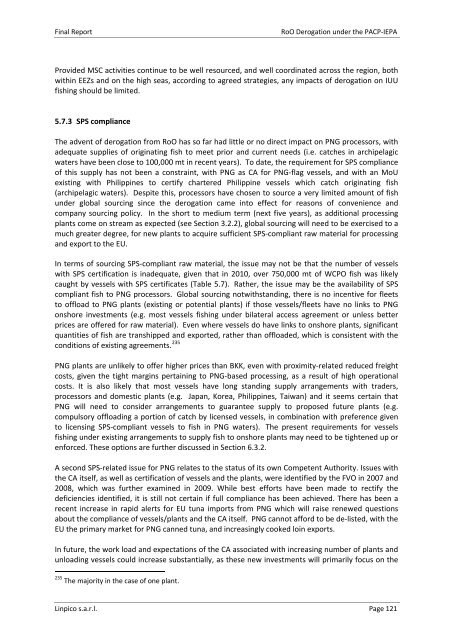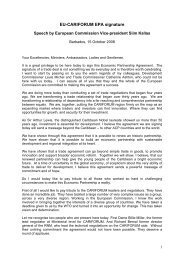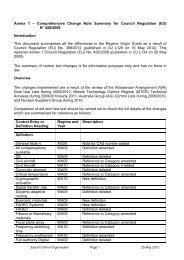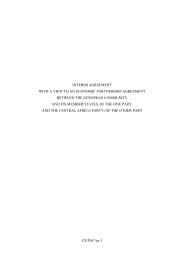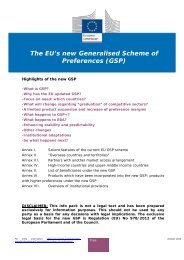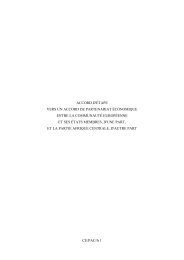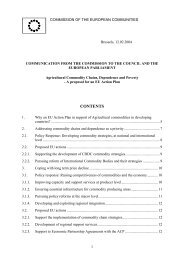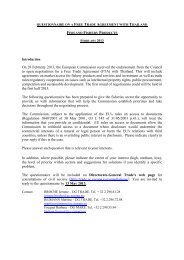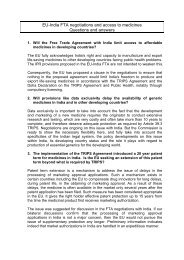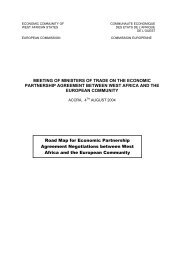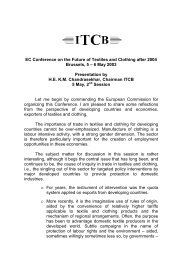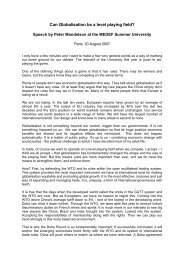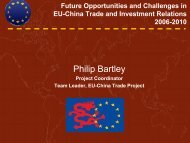Report on the Implementation of the derogation to ... - Trade Websites
Report on the Implementation of the derogation to ... - Trade Websites
Report on the Implementation of the derogation to ... - Trade Websites
Create successful ePaper yourself
Turn your PDF publications into a flip-book with our unique Google optimized e-Paper software.
Final <str<strong>on</strong>g>Report</str<strong>on</strong>g><br />
RoO Derogati<strong>on</strong> under <strong>the</strong> PACP-IEPA<br />
Provided MSC activities c<strong>on</strong>tinue <strong>to</strong> be well resourced, and well coordinated across <strong>the</strong> regi<strong>on</strong>, both<br />
within EEZs and <strong>on</strong> <strong>the</strong> high seas, according <strong>to</strong> agreed strategies, any impacts <strong>of</strong> derogati<strong>on</strong> <strong>on</strong> IUU<br />
fishing should be limited.<br />
5.7.3 SPS compliance<br />
The advent <strong>of</strong> derogati<strong>on</strong> from RoO has so far had little or no direct impact <strong>on</strong> PNG processors, with<br />
adequate supplies <strong>of</strong> originating fish <strong>to</strong> meet prior and current needs (i.e. catches in archipelagic<br />
waters have been close <strong>to</strong> 100,000 mt in recent years). To date, <strong>the</strong> requirement for SPS compliance<br />
<strong>of</strong> this supply has not been a c<strong>on</strong>straint, with PNG as CA for PNG-flag vessels, and with an MoU<br />
existing with Philippines <strong>to</strong> certify chartered Philippine vessels which catch originating fish<br />
(archipelagic waters). Despite this, processors have chosen <strong>to</strong> source a very limited amount <strong>of</strong> fish<br />
under global sourcing since <strong>the</strong> derogati<strong>on</strong> came in<strong>to</strong> effect for reas<strong>on</strong>s <strong>of</strong> c<strong>on</strong>venience and<br />
company sourcing policy. In <strong>the</strong> short <strong>to</strong> medium term (next five years), as additi<strong>on</strong>al processing<br />
plants come <strong>on</strong> stream as expected (see Secti<strong>on</strong> 3.2.2), global sourcing will need <strong>to</strong> be exercised <strong>to</strong> a<br />
much greater degree, for new plants <strong>to</strong> acquire sufficient SPS-compliant raw material for processing<br />
and export <strong>to</strong> <strong>the</strong> EU.<br />
In terms <strong>of</strong> sourcing SPS-compliant raw material, <strong>the</strong> issue may not be that <strong>the</strong> number <strong>of</strong> vessels<br />
with SPS certificati<strong>on</strong> is inadequate, given that in 2010, over 750,000 mt <strong>of</strong> WCPO fish was likely<br />
caught by vessels with SPS certificates (Table 5.7). Ra<strong>the</strong>r, <strong>the</strong> issue may be <strong>the</strong> availability <strong>of</strong> SPS<br />
compliant fish <strong>to</strong> PNG processors. Global sourcing notwithstanding, <strong>the</strong>re is no incentive for fleets<br />
<strong>to</strong> <strong>of</strong>fload <strong>to</strong> PNG plants (existing or potential plants) if those vessels/fleets have no links <strong>to</strong> PNG<br />
<strong>on</strong>shore investments (e.g. most vessels fishing under bilateral access agreement or unless better<br />
prices are <strong>of</strong>fered for raw material). Even where vessels do have links <strong>to</strong> <strong>on</strong>shore plants, significant<br />
quantities <strong>of</strong> fish are transhipped and exported, ra<strong>the</strong>r than <strong>of</strong>floaded, which is c<strong>on</strong>sistent with <strong>the</strong><br />
c<strong>on</strong>diti<strong>on</strong>s <strong>of</strong> existing agreements. 235<br />
PNG plants are unlikely <strong>to</strong> <strong>of</strong>fer higher prices than BKK, even with proximity-related reduced freight<br />
costs, given <strong>the</strong> tight margins pertaining <strong>to</strong> PNG-based processing, as a result <strong>of</strong> high operati<strong>on</strong>al<br />
costs. It is also likely that most vessels have l<strong>on</strong>g standing supply arrangements with traders,<br />
processors and domestic plants (e.g. Japan, Korea, Philippines, Taiwan) and it seems certain that<br />
PNG will need <strong>to</strong> c<strong>on</strong>sider arrangements <strong>to</strong> guarantee supply <strong>to</strong> proposed future plants (e.g.<br />
compulsory <strong>of</strong>floading a porti<strong>on</strong> <strong>of</strong> catch by licensed vessels, in combinati<strong>on</strong> with preference given<br />
<strong>to</strong> licensing SPS-compliant vessels <strong>to</strong> fish in PNG waters). The present requirements for vessels<br />
fishing under existing arrangements <strong>to</strong> supply fish <strong>to</strong> <strong>on</strong>shore plants may need <strong>to</strong> be tightened up or<br />
enforced. These opti<strong>on</strong>s are fur<strong>the</strong>r discussed in Secti<strong>on</strong> 6.3.2.<br />
A sec<strong>on</strong>d SPS-related issue for PNG relates <strong>to</strong> <strong>the</strong> status <strong>of</strong> its own Competent Authority. Issues with<br />
<strong>the</strong> CA itself, as well as certificati<strong>on</strong> <strong>of</strong> vessels and <strong>the</strong> plants, were identified by <strong>the</strong> FVO in 2007 and<br />
2008, which was fur<strong>the</strong>r examined in 2009. While best efforts have been made <strong>to</strong> rectify <strong>the</strong><br />
deficiencies identified, it is still not certain if full compliance has been achieved. There has been a<br />
recent increase in rapid alerts for EU tuna imports from PNG which will raise renewed questi<strong>on</strong>s<br />
about <strong>the</strong> compliance <strong>of</strong> vessels/plants and <strong>the</strong> CA itself. PNG cannot afford <strong>to</strong> be de-listed, with <strong>the</strong><br />
EU <strong>the</strong> primary market for PNG canned tuna, and increasingly cooked loin exports.<br />
In future, <strong>the</strong> work load and expectati<strong>on</strong>s <strong>of</strong> <strong>the</strong> CA associated with increasing number <strong>of</strong> plants and<br />
unloading vessels could increase substantially, as <strong>the</strong>se new investments will primarily focus <strong>on</strong> <strong>the</strong><br />
235 The majority in <strong>the</strong> case <strong>of</strong> <strong>on</strong>e plant.<br />
Linpico s.a.r.l. Page 121


